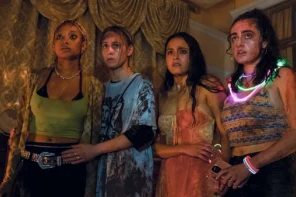Content warning: Rape and sexual abuse.
Nobody in Hollywood deserves their success less than Bryan Singer. Not only because all of his films are bad, but because he will never make a good film, and that is an absolute certainty. The experience of watching one of his films a is violent whiplash between tastelessness and deadly boredom. Singer’s auteurist signature is laziness manifest, the interior meaning of his work a resolute cry of “whatever, they won’t notice, they won’t care.” In that sense, Bohemian Rhapsody might be his masterpiece.
If you want to replicate the experience of watching Bohemian Rhapsody, watch the masterful musical biopic spoof, Walk Hard, and imagine that the people who made it aren’t joking. Every story beat – from the “Freddie Mercury has to think about his whole life before he sings” framing device, right down to the Dark Period montage – is straight out of the biopic textbook. Along with them, come brutally obvious period decor and a by-the-book (yet still incoherent) visual style. I was roused only twice, by what were the film’s worst ideas: an awful-looking series of edits during Another One Bites the Dust and a Mike Myers cameo that has to be seen to be believed.
It must be conceded that Rami Malek, the lone man making an effort, impersonates Mercury’s mannerisms impressively. However, to put it frankly, it’s impossible to see his performance behind those massive false teeth. They hang in the foreground of almost every shot, ensuring that you are never allowed to take the film the slightest bit seriously. This might seem like a nitpick, but no: those false teeth are Bohemian Rhapsody in microcosm, the most omnipresent and nagging example of both its obviousness and its phoniness. Those teeth are equally as hacky as every hairpiece, costume, and awful green-screen recreation of 70s London.
The film’s approach to the true story of Queen is just as false as those teeth. Cataloguing the film’s myriad half-truths and outright lies is a job for someone else, but I’ll list the most egregious two falsehoods, in my opinion. The first, Mercury’s meeting with his real-life partner, Jim Hutton, which the film portrays as Mercury drunkenly grabbing his ass after a party and having a sad discussion about his lonely, debaucherous (read: queer) lifestyle. In reality, Mercury met Hutton at a gay bar and didn’t sexually assault him. The second, Mercury coming out to his bandmates about having AIDS before the climactic Live Aid concert, proclaiming that he wouldn’t try to garner sympathy from the crowd, nor be a sad HIV-positive poster child. In reality, Mercury wasn’t diagnosed until two years after Live Aid, so essentially, the film is guilty of making Mercury that sad poster child in the very scene where Mercury condemns that idea. The truth is constantly stretched and ignored for the purpose of cheap, lazy drama. “They won’t notice, they won’t care.”
There isn’t a single scene where Freddie Mercury is allowed to be both gay and happy at once.
Of course, all true-story films are ultimately false. In this case, what matters more than the falsehoods is their sum: a film which encourages the viewer to root for Mercury to get back into his heterosexual relationship and free himself from his gay abuser, a film which depicts Mercury’s illness as an inevitable consequence of his lifestyle, and a film which is inexcusably squeamish about showing any sort of queer love onscreen. Indeed, the film is consistently cutting away and alluding to offscreen wild parties and gay bars that I would rather have seen instead of tedious bandmate bickering. There isn’t a single scene where Freddie Mercury is allowed to be both gay and happy at once.
For example, I was shocked that despite playing the song Under Pressure, the film never depicts the recording session. It toils tediously over every detail of the recording of Rhapsody but erases the historic and (likely) gloriously fun meeting of Bowie and Mercury. What would these two queer men living in homophobic societies, who represented their queerness through their art, have to say to each other? Is the film really so uninterested in this? No, it’s been excised for the simple reason that it violates the film’s ultimately conservative moralizing. Depicting two queer men being happy together would short circuit the film’s internal logic, like a computer trying to divide by zero. Perhaps that’s why the Another One Bites the Dust sequence looks the way it does – unable to depict a gay man at a gay club in a non-tragic light, the notion of filmic reality itself breaks down.
That shameful, regressive morality goes beyond merely the film’s plot, it’s a part of the film’s production. I won’t go into the worst of it here, but just know that Bryan Singer’s history of rape and sexual abuse isn’t just well documented in the post-Me-Too era, but has been an open secret in the industry for longer than I’ve been alive: Singer was first accused of improper conduct with minors in 1997, then of rape in 2014, and again in 2017 before he was hired to work on Bohemian Rhapsody. In this case, there’s no plausible deniability, and it’s not like Singer is deeply beloved in the industry (on this set, among other things, he provoked a physical fight with Rami Malek), nor is he known for being a professional craftsman who can reliably turn in a product. What was going through the minds of the people who hired Singer? I’ll tell you what: “They won’t notice. They won’t care.”
Nevertheless, I’m an anomaly. Most people who bought a ticket to Bohemian Rhapsody have no idea who Bryan Singer is and what he’s done to Freddie Mercury’s story. They only know that they really like Queen and want to see the origins of their favourite songs. If you bought a ticket to Bohemian Rhapsody and enjoyed yourself, I don’t begrudge your enjoyment. However, if, like me, you know the facts about Singer and still bought your ticket, I hope you felt the same sinking feeling in your stomach that I did: a vomitive curdled rumbling, like I was buying Singer a margarita during his next Caribbean vacation.
How are we to separate Singer’s sexual abuse from the completely false scene of drunken sexual abuse that he fabricated and inserted into Freddie Mercury’s life?
It’s difficult to learn that a work of art that you love, especially one that’s made you feel seen, has been made by a monster. In fact, learning this is an experience that women and queer people disproportionately go through (though it also bears highlighting that plenty of queer critics did not feel seen). If you’re a queer person who was moved by this film, or perhaps by the gay allegory in Singer’s X-Men films, I don’t want to take those feelings away from you. Yet, acknowledging the man behind those works, no matter how inconvenient, is a responsibility. For example, when I brought up David Bowie I should’ve added that he has also committed statutory rape. It’s much too easy to gloss over, to forget, to excuse, when it’s an artist that you like, and indeed one that means a lot to you. However, Bowie’s death makes his case much easier. Singer, by contast, is alive, raking in residuals and already in talks to make his next film. Expressing sympathy for the survivors of his crimes and avoiding his future projects is the only proper way to respond to learning the facts.
The improper way is to make excuses, to try to poke holes in the accusations, to mention that he was fired from the set (technically true, though he’s still credited as the film’s sole director), and to say we must separate the artist from the art. Even ignoring the fact that Bohemian Rhapsody is a film about documenting the personal circumstances that led to the writing of Mercury’s songs (in other words, connecting the artist to the art), the film’s quality and falsehoods can be directly charted to its authors. How are we to separate Singer’s nondescript, cheap visual style from his on-set laziness? How are we to separate the choppy and baffling editing from the fact that Singer left the set before completion? How are we to separate the (untrue) portrayal of Mercury as a badly behaved genius from the badly behaved wannabe behind the camera? How are we to separate Singer’s sexual abuse from the completely false scene of drunken sexual abuse that he fabricated and inserted into Freddie Mercury’s life?
All that context raises the ultimate question: how can you honestly review a film that is, itself, a document of systemic abuse? How can you accurately judge the emotional and aesthetic quality of a work of art when that art exists as a force to bring more evil into the world? It wouldn’t merely do to state that Bohemian Rhapsody is the worst film of 2018 or even the worst film I’ve seen since I started writing for The Bull and Bear. It won’t be enough to state that it’s more incoherent and formally baffling than Gotti, more tasteless and outrageous than Life Itself, and an even greater object of disposable trash than The Cloverfield Paradox and Fifty Shades Freed and Death of a Nation. Yes, I’ve seen all those films, and they’re all the result of filmmakers trying and failing to make something worthwhile. This film is nothing but a monument to laziness and complacency, and in this year, in this industry, complacency is complicity.









Fantastically well-said! Thank you for sharing and shedding light on this oft-ignored topic!